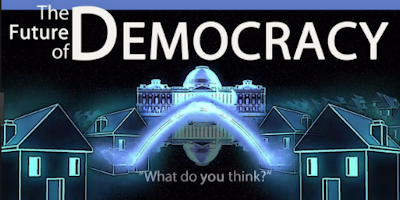Future Democracy - Alternative Models of Democracy
Join us in this meeting at Conway Hall where we look at the inadequacies of our democratic system and consider four alternatives to create a better democracy for us all.
This will be the first meeting in our series held jointly with the Conway Hall Ethical Society and that will look at different models of Future Democracy and also Education Transformation.. Each meeting will have a £5 entrance fee but for fully paid up members of GlobalNet21 and the Ethical Society then it will be free. You can choose to join GlobalNet21 or the Conway Hall Ethical Society and get access to all our events in the coming year free of charge.
It is clear that our existing system of representative democracy falls short of providing good government or adequately representing the will of the people. As a result there has been growing discontent and a lack of trust in both politics and politicians.
But if our existing system is no longer fit for purpose then what is the solution. What alternative is there that can form the basis for a more inclusive democracy.
Here we look at four alternative models of democracy and open the discussion up to those there so that we can not just identify what is wrong with the present system but how we can move forward to one restores our faith in the political process.
The four models that we will examine and discuss are.
• Deliberative Democracy is an effective way of engaging citizens in the democratic process at a much deeper level than voting. Pilot projects around the world have consistently shown how ordinary citizens are capable of intelligent dialogue that produces clear-sighted policy proposals. Drawing on his work with the Wise Democracy Pattern Language Andy will outline the reasons why citizen deliberation is vital for future democracy."

This will be presented by Andy Paice whose work is to facilitate and catalyse new ways of working and living that are fit for the realities of the 21st century. He coaches people, offers mindfulness classes and runs workshops and trainings. He is a champion of deeper and more participatory forms of democracy.
• Sortition is the use of random selection to populate assemblies or fill political positions. An assembly that uses sortition would be composed of people just like you and me: it would be a representative random sample of people, making decisions in an informed, fair and deliberative setting.

This will be presented by Peter Cross of the Sorition Foundation. Peter’s interest in and frustration with the poor state of our “democratic” government was awakened when he came across the idea of sortition. He recently joined The Sortition Foundation which aims to promote and to institute sortition as a means of empowering citizens’ assemblies.
• Digital Democracy With the advent of the Internet can democracy be effectively based on the people's will and can it replace representative democracy with more direct online citizen involvement? And can it make democracy global where many of the decisions we face cross national boundaries. Using digital tools and methods like hackathons can our democracy change for the better?

This will be presented by Max Kalis a Senior Strategist at Start, an agency delivering problem solving brand, retail and digital design. He also founded the Influx Trust, a charity for promoting better understanding and engagement between the UN and the public, which delivered a global hackathon series ‘Connect2Effect’ in 9 countries in 2017 to support public engagement with the Sustainable Development Goals (www.connect2effect.com ).
• Proportional Representation is the idea that seats in parliament should be allocated so that they are in proportion to the votes cast. Rather than the winner-take all approach of other systems, proportional representation ensures that votes carry equal weight.

This will be presented by Jessica Garland who is the Director of Policy and Research at the Electoral Reform Society. Jess is a former Senior Political Adviser, she has spent six years working in Parliament for Shadow Ministers and MPs. Jess is responsible for policy and research development for the Society. She has a Research Masters in Government, Policy and Politics and was formerly Chair of a youth-led volunteering charity.
Location
Dates
to 22nd January 2018 - 08:30 PM
